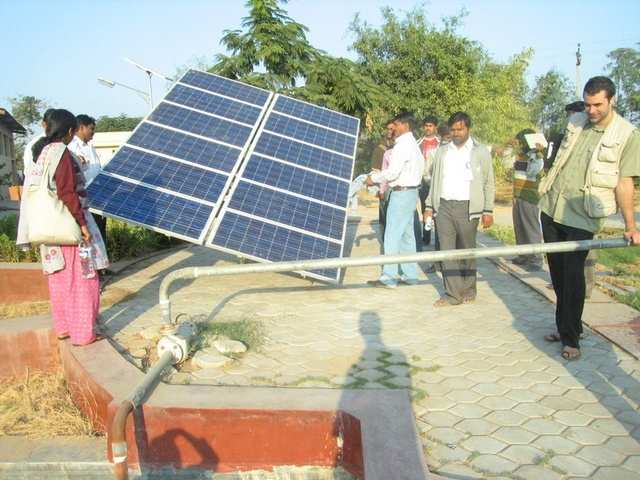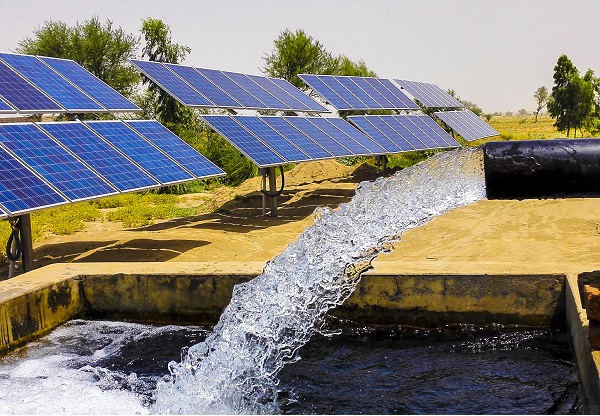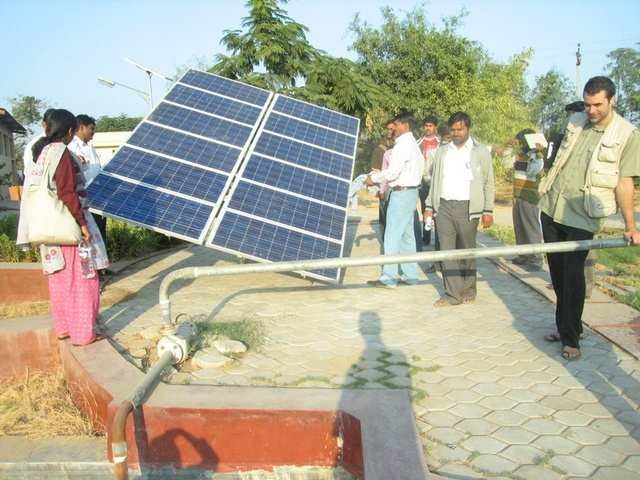Solar Pumping and its benefits to Farmers

Agriculture is the world’s largest industry. Intensive agriculture as it has been practiced, since ancient times but over time depletes the soil and pollutes the environment ( and we have seen the ill effects of farm fires in North India), biodiversity loss, etc. The recent awareness of the limits of natural resources and pollution of soil, air, and water are pushing for sustainable farming. Solar Pumping for Irrigation can be the game-changer for the agricultural sector and the farmers. Solar Energy is one of the most versatile forms of energy, with boundless potential if tapped wisely. It will not only reduce the consumption of precious water but also reduce the dependency on the grid. Generating energy from solar will become an additional revenue stream for farmers.
India is an agrarian economy. Although agriculture’s share of India’s economy is declining—it contributes to less than 15% of India’s GDP—it still employs 50% of the country’s workforce. Not surprisingly, perhaps, up to 20% of all the electricity used in India is for agriculture.
There are many states in India, where the power for agriculture purposes is highly subsidized, thus farmers receive an uninterrupted supply of electricity especially during a nighttime. This often causes farmers to leave their pumps all the time. These wastes both electricity and water, with too much energy and water being used.
Agricultural demand for electricity is one of the largest burdens on India’s power sector as the irrigation sector is highly undeveloped and farmers are dependent on electricity to power their pumps. Solar can mitigate this entire portion of the demand by generating power at the source and converting users into suppliers. Even if each farmer uses a small portion of their land to generate electricity from solar and install solar pumping for irrigation, it will be enough for their needs, all while taking the burden off DISCOM’s shoulders.

Solar energy is being widely adopted in commercial, industrial and residential sectors and it has huge potential to benefit the agricultural sector. Therefore, with an endeavor to offer financially and water security to farmers, the Indian government launched various schemes to promote the installation of grid-connected solar power plants and solar pumps to meet irrigation needs for farmers.
The scheme launched by the government has three main components.
Component A – 10,000 MW of Decentralized Ground-Mounted Grid-Connected Renewable Power Plants of 500 kW to 2 MW individual plant size to be commissioned by 2022.
Component B – 17.50 lakh standalone solar-powered pumps with capacity up to 7.5 HP to replace diesel-powered agricultural pumps.
Component C – 10 lakh grid-connected agricultural pumps with up to 7.5 HP individual pump capacity to be solarized by 2022.
Solar energy can be used in agriculture in several ways, saving money, increasing self-reliance, and reducing pollution. Solar based Pumping can cut a farm’s electricity needs. By installing solar water pumps and grid-connected solar power plants, the farmers will be benefited in the form of a stable source of income for the next 25 years. In this way, farmers can even earn from their non-cultivable land. Solar heat collectors can be used to dry crops and warm homes, livestock buildings. Solar energy can also be used in solar water heaters. Solar pumps will help farmers to save a huge amount of cost that is being spent on buying the diesel.
Solar pumps – utilize a clean source of energy – the Sun – and will also provide a reliable source of irrigation to farmers. Farmers can feed surplus power to the grid and save both electricity and water.
Generating solar energy at agricultural land, is the game changing program for the India. Indian government must accelerate and encourage the development and installation of such solar power plants by farmers – more so the solar pumping for irrigation purposes by farmers. The Indian government should provide favorable government policies to ease the process and provide the startup capital to promote the growth of solar energy. Solar energy is win – win situation for India and environment and has potential to power India’s economy.
It is also important to convey to the farmers the benefit of installing solar power with a view to improving their own financial status. Communication is the key to the success of this program which has the potential to not only improve the financial situation of the farmer but also nationally reduce the impact of global warming.

